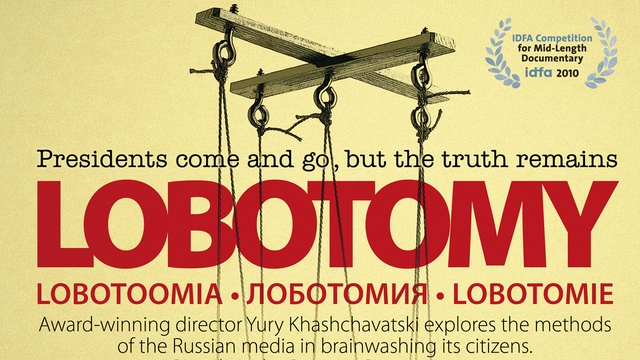Reportage has become an essential part of any war, but in the Russian-Georgian conflict it is propaganda that has dominated the press. In this wonderfully sardonic documentary, an artful collision of fact and fiction exposes Russia's ongoing abuse of the mass media. A fiercely intimate narrative presence provides a very personal indictment of Russian propaganda tactics, laying bare the state's relationship with its people.
In 2008, on televisions around Russia the message came forth:
"The Russian military was forced to undertake police actions to keep order". Meanwhile, in the war zone, Georgians desperately tried to stop Russian soldiers from looting.
"If you filch it, you could at least hide it", one man shouts at a soldier who has stuffed silverware into his knapsack. This is not an isolated incident; pictures show Russian soldiers forcing Georgian citizens from their cars and smuggling carpets into their tanks. CCTV captures more Russian soldiers clearing out a bank - it certainly seems as if their protection of private property is a little over-zealous.
What is even more astounding is that many of the images of this conflict shown on Russian TV were broadcast before any TV crews had arrived in Georgia. Much of the footage shown of Georgian tanks 'shooting everyone in sight' looks fabricated.
"Everything we had to transmit had been transmitted before it happened", says journalist Vadim Rechkalov. The Russians were telling the story of the war before anyone on the ground knew what had happened and for journalists like Vadim it created a situation in which telling the truth was impossible:
"It had already been accepted, it was useless to try and disprove it".
However, the war with Georgia and the control of the media reaction to it is just the point of departure in this documentary's exploration of the Russian media's brainwashing tactics, which argues that it was just a symptom of a greater problem within Russia.
"If you want to understand Russian politics watch 'The Godfather'". Many accuse the Russian government of systematic corruption and say it has contributed to a society where many live in extreme poverty.
"They had to distract people from the problems in Russia and they needed an enemy to lay the blame on". But why was Georgia the enemy they chose?
"Animosity arose because Georgia becoming a Western state was a shame for Russians", says writer and journalist Yulia Latynina. Footage filmed by Russian soldiers in Georgia gives an indication as to why the standard of living there was such an embarrassment for the Russians.
"They had everything! Meanwhile, we live like beggars!" shout the Russian soldiers as they look around a Georgian barracks.
As the 'United Russia' party continues to steadily win elections,it continues to keep the media in its iron grip. Every show of bravura from its leaders disguises an entrenched system of repression. Russia no longer needs gulags and show trials to keep its people subjugated, all it takes is a camera and an active imagination.
 Reportage has become an essential part of any war, but in the Russian-Georgian conflict it is propaganda that has dominated the press. In this wonderfully sardonic documentary, an artful collision of fact and fiction exposes Russia's ongoing abuse of the mass media. A fiercely intimate narrative presence provides a very personal indictment of Russian propaganda tactics, laying bare the state's relationship with its people.
Reportage has become an essential part of any war, but in the Russian-Georgian conflict it is propaganda that has dominated the press. In this wonderfully sardonic documentary, an artful collision of fact and fiction exposes Russia's ongoing abuse of the mass media. A fiercely intimate narrative presence provides a very personal indictment of Russian propaganda tactics, laying bare the state's relationship with its people.







